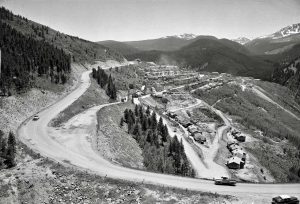Vail prepares to launch new loading and delivery regulations, courier program in October
Some business owners worry that the cost of the new delivery fees will be passed down to them

Courtesy Photo
Starting on Saturday, Oct. 1, there will be no more delivery trucks within the pedestrian areas of Vail Village and Lionshead as the town implements its new loading and delivery regulations and launches the E-Vail Courier Program.
Finding a solution to delivering products in Vail has been in the making since the town’s inception, said Vail Police Commander Ryan Kenney in a phone call with the Vail Daily on Monday.
“In the late ’60s early ’70s when they were developing Vail, they were realizing that bringing goods and services in was something that they were going to have to plan and be careful about,” Kenney said.
Over the years, he added, the town took “baby steps” to address this — including working with key vendors, primarily hotels, to add loading docks as part of its development agreements.
“They added these loading docks with the plan of eventually forcing all the trucks off the road into the loading docks so we wouldn’t have trucks in Vail Village or in Lionshead,” Kenney said.

Support Local Journalism
Kenney added that having delivery trucks in the villages has been the source of many complaints over the years.
“I’d say loading and delivery and all that comes along with it is probably our No. 1 complaint that we receive from the village,” he said.
These complaints, he added, came from businesses that didn’t want an 18-wheeler parked in front of their business, blocking their storefront for several hours; skiers who had to navigate the vehicles to get to the mountain; and lodging establishments that didn’t want their guests to have these big trucks idling outside of their hotel windows.
“It’s bad in the winter time, it’s unbearable in the summertime,” Kenney said. “It’s not ideal, it’s very dangerous to have pedestrians and delivery vehicles interacting in such a small area. We tried to make changes over the years to make it safer and I think a lot of those changes did make it safer, but this is really, this is the ultimate solution is to try and limit that interaction as much as possible.”
Not only that, but having these trucks idling for “hours at a time” goes against the town’s climate action goals and directives, he said.
The regulations and courier program that are going into effect this week are a result of addressing these complaints and concerns. Starting a few years back, the police department convened a work group of stakeholders including businesses, town staff, business owners and members of the public to try and find a solution that worked for Vail.
Spanning multiple years — and also delayed by COVID-19 — Kenney said the result was the E-Vail Courier pilot program that launched with the local delivery logistics company, 106West. The pilot program ran starting in winter 2021 and through summer 2022, and used small electric vehicles to deliver goods from the town’s six loading docks to businesses in the village.
And, in August 2022, the Town Council gave its approval to codify the program and transition to full implementation, beginning Oct. 1.
At its launch, delivery vehicles will no longer be allowed in the pedestrian areas of Lionshead and Vail Village — with the exception of “high-volume commercial carriers” including FedEx, UPS and the U.S. Postal Service. Instead, delivery access will only be allowed through loading docks at the Arrabelle, Four Seasons, Mountain Plaza, One Willow, Sebastian and Solaris.
106West will be operating the courier system from the Mountain Plaza loading dock, Kenney said.
In order to keep up with the increased traffic and usage of these loading docks, delivery companies will be required to pay an annual dock fee to receive a permit to enter any of these six docks, according to Kenney.
“Right now, the only cost is to the delivery companies,” he said. “The delivery company, depending on their size, the amount of time they use the dock, the amount of delivery locations they have — they pay a tiered system to get into the dock.”
Initial iterations of the ordinance included a business fee as well, but following input from businesses and direction from the Town Council, that portion of the ordinance was removed. However, there has been some concern that the new loading and delivery fees will get passed down to businesses.
At its Tuesday, Sept. 20, Town Council meeting, in approving the $1.3 million contract with 106West for the courier program, Council member Kevin Foley was the sole dissenting vote.
On Monday, Foley told the Vail Daily that his no vote was in response to concerns he’d heard from the business community on these fees being passed down.
“The transport companies are going to start adding service charges to make up the revenue, the money that they’re having to pay in to go to the loading docks,” he said.
“Our business community is collecting sales tax, which is paying for a whole lot of stuff here in our town, and if they’re going to get double dipped because the town wants to get the trucks off the street, then maybe the town should be paying for it and not the purveyors that are doing business with our business community. The costs that are coming from the trucking companies are going to get passed down through the businesses,” Foley added.
Matt Cardille, owner of Fuzziwigs in Vail, said that he is already seeing costs passed down from his distributors as a result of this.
“They’re charging us more for deliveries because they’re being charged to use the docks,” he told the Vail Daily on Monday.
“At this juncture, the costs outweigh the benefit, just because it is so costly to do it,” Cardille said, adding that: “I don’t think that this was anything that any of the businesses in town were looking for.”
“When you look at the petition for who was asking this to be done, it was the people that have places right in the town core, and they’re not here all the time, so it’s the businesses that are the ones that are having to deal with all of this going on,” Cardille said.
This, he also said, just adds to the costs of running a business, which have all “been going up for the past three years on everything.”
“Everything is going up,” Cardille said.
Still, Cardille did add that he sees the environmental benefits of the program.
To this concern of businesses, Kenney said that they have “spoken to almost every delivery company and the response that we got is they’re either saving money or it’s a net zero increase for them, because of the amount of time they’re saving because their driver isn’t hand trucking things all over the village anymore; they show up, they unload their truck and they leave.”
“They can deliver to multiple other locations in that four to five hours that they’re saving,” Kenney added. “Up to this point, we have not heard from a delivery company that’s said that they’re going to raise their delivery rate.”
Drew Riley, the CEO of Slope Enterprises which runs Russell’s, Los Amigos and Bridge Street Lockers in Vail, told the Vail Daily Monday that he’s heard something similar from delivery companies.
“From talking to the US Foods and the bigger delivery people, they are all for it and even paying whatever fee because the amount of time that it saves them is significant,” Riley said. “From everyone that I’ve talked to on the delivery side — obviously they wouldn’t say that they’re going to pass the fees along — but they see so much value in being able to easily come up, drop it all off and they’re gone. The amount of cost savings that they receive doesn’t even come close to the price that Vail’s going to charge them.”
As far as the program being a solution to a problem in the village, Riley said it doesn’t necessarily provide “any additional ease or help to the business directly, as long as I still get the product that I need to get.”
“It’s basically just a different way to skin the cat,” he said.
While the new loading and delivery regulations are going into effect on Saturday, not all businesses have to participate in the E-Vail delivery service, which has been a bit of a misnomer, Kenney said.
“They absolutely don’t have to use our delivery service, the only thing they have to do — is delivery companies have to deliver to one of the six loading docks,” he said. “What they choose to do from there is up to them. It’s an option if they want to use it, they can. If they don’t, they don’t have to — the drivers can continue to hand truck their deliveries down into the village from any one of the loading docks.”
Kenney said the town has been working hard to spread the word about the new program and delivery fees, however, and said he anticipates a bit of a grace period and learning curve as all get up to speed on the changes.
“We know it’s going to take some time to get everyone through the dock permitting process, so there’s a grace period in there, but eventually, if a company fails to get a dock permit, there are fines involved,” he said.
Overall, however, he sees the new regulations and program as a net positive moving forward.
“This is a new program and I think it’s really good for the town, I think it’s good for the environment, I think it’s good for the businesses,” he said. “It’s been in the making — almost since Vail’s inception — to come to this. It’s been a long journey and I think this is a good step in the right direction.”
For more information on the program, visit VailGov.com.










